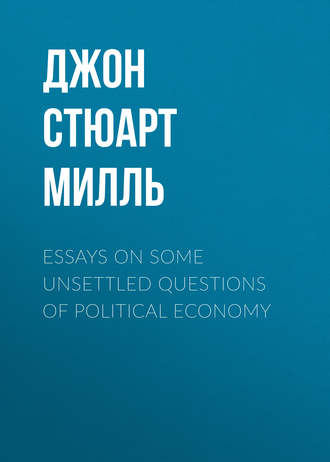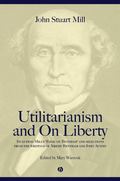
Джон Стюарт Милль
Essays on some unsettled Questions of Political Economy
In consequence of these views, it has been customary to judge of the general rate of profits at any time or place, by the rate of interest at that time and place: it being supposed that the rate of interest, though liable to temporary fluctuations, can never vary for any long period of time unless profits vary; a notion which appears to us to be erroneous.
It was observed by Adam Smith, that profits may be considered as divided into two parts, of which one may properly be considered as the remuneration for the use of the capital itself, the other as the reward of the labour of superintending its employment; and that the former of these will correspond with the rate of interest. The producer who borrows capital to employ it in his business, will consent to pay, for the use of it, all that remains of the profits he can make by it, after reserving what he considers reasonable remuneration for the trouble and risk which he incurs by borrowing and employing it.
This remark is just; but it seems necessary to give greater precision to the ideas which it involves.
The difference between the profit which can be made by the use of capital, and the interest which will be paid for it, is rightly characterized as wages of superintendance. But to infer from this that it is regulated by entirely the same principles as other wages, would be to push the analogy too far. It is wages, but wages paid by a commission upon the capital employed. If the general rate of profit is 10 per cent, and the rate of interest 5 per cent, the wages of superintendance will be 5 per cent; and though one borrower employ a capital of 100,000l., another no more than 100l., the labour of both will be rewarded with the same per centage, though, in the one ease, this symbol will represent an income of 5l., in the other case, of 5000l. Yet it cannot be pretended that the labour of the two borrowers differs in this proportion. The rule, therefore, that equal quantities of labour of equal hardness and skill are equally remunerated, does not hold of this kind of labour. The wages of any other labour are here an inapplicable criterion.
The wages of superintendance are distinguished from ordinary wages by another peculiarity, that they are not paid in advance out of capital, like the wages of all other labourers, but merge in the profit, and are not realized until the production is completed. This takes them entirely out of the ordinary law of wages. The wages of labourers who are paid in advance, are regulated by the number of competitors compared with the amount of capital; the labourers can consume no more than what has been previously accumulated. But there is no such limit to the remuneration of a kind of labour which is not paid for out of wealth previously accumulated, but out of that produce which it is itself employed in calling into existence.
When these circumstances are duly weighed, it will be perceived, that although profit may be correctly analyzed into interest and wages of superintendance, we ought not to lay it down as the law of interest, that it is profits minus the wages of superintendance. Of the two expressions, it would be decidedly the more correct, that the wages of superintendance are regulated by the rate of interest, or are equal to profits minus interest. In strict, propriety, neither expression would be allowable. Interest, and the wages of superintendance, can scarcely be said to depend upon one another. They are to one another in the same relation as wages and profits are. They are like two buckets in a well: when one rises, the other descends, but neither of the two motions is the cause of the other; both are simultaneous effects of the same cause, the turning of the windlass.
There are among the capitalists of every country a considerable number who are habitually, and almost necessarily, lenders; to whom scarcely any difference between what they could receive for their money and what could be made by it, would be an equivalent for incurring the risk and labour of carrying on business. In this predicament is the property of widows and orphans; of many public bodies; of charitable institutions; most property which is vested in trustees; and the property of a great number of persons unused to business, and who have a distaste for it, or whose other occupations prevent their engaging in it. How large a proportion of the property lent to the nation comes under this description, has been pointed out in Mr. Tooke's Considerations on the State of the Currency.
There is another large class, consisting of bankers, bill-brokers, and others, who are money-lenders by profession; who enter into that profession with the intention of making such gains as it will yield them, and who would not be induced to change their business by any but a very strong pecuniary inducement.
There is, therefore, a large class of persons who are habitually lenders. On the other hand, all persons in business may be considered as habitually borrowers. Except in times of stagnation, they are all desirous of extending their business beyond their own capital, and are never desirous of lending any portion of their capital except for very short periods, during which they cannot advantageously invest it in their own trade.
There is, in short, a productive class, and there is, besides, a class technically styled the monied class, who live upon the interest of their capital, without engaging personally in the work of production.
The class of borrowers may be considered as unlimited. There is no quantity of capital that could be offered to be lent, which the productive classes would not be willing to borrow, at any rate of interest which would afford them the slightest excess of profit above a bare equivalent for the additional risk, incurred by that transaction, of the evils attendant on insolvency. The only assignable limit to the inclination to borrow, is the power of giving security: the producers would find it difficult to borrow more than an amount equal to their own capital. If more than half the capital of the country were in the hands of persons who preferred lending it to engaging personally in business, and if the surplus were greater than could be invested in loans to Government, or in mortgages upon the property of unproductive consumers; the competition of lenders would force down the rate of interest very low. A certain portion of the monied class would be obliged either to sacrifice their predilections by engaging in business, or to lend on inferior security; and they would accordingly accept, where they could obtain good security, an abatement of interest equivalent to the difference of risk.
This is an extreme case. Let us put an extreme case of a contrary kind. Suppose that the wealthy people of any country, not relishing an idle life, and having a strong taste for gainful labour, were generally indisposed to accept of a smaller income in order to be relieved from the labour and anxiety of business. Every producer in flourishing circumstances would be eager to borrow, and few willing to lend. Under these circumstances the rate of interest would differ very little from the rate of profit. The trouble of managing a business is not proportionally increased by an increase of the magnitude of the business; and a very small surplus profit above the rate of interest, would therefore be a sufficient inducement to capitalists to borrow.
We may even conceive a people whose habits were such, that in order to induce them to lend, it might be necessary to offer them a rate of interest fully equal to the ordinary rate of profit. In that case, of course, the productive classes would scarcely ever borrow. But government, and the unproductive classes, who do not borrow in order to make a profit by the loan, but from the pressure of a real or supposed necessity, might still be ready to borrow at this high rate.
Although the inclination to borrow has no fixed or necessary limit except the power of giving security, yet it always, in point of fact, stops short of this; from the uncertainty of the prospects of any individual producer, which generally indisposes him to involve himself to the full extent of his means of payment. There is never any permanent want of market for things in general; but there may be so for the commodity which any one individual is producing; and even if there is a demand for the commodity, people may not buy it of him but of some other. There are, consequently, never more than a portion of the producers, the state of whose business encourages them to add to their capital by borrowing; and even these are disposed to borrow only as much as they see an immediate prospect of profitably employing. There is, therefore, a practical limit to the demands of borrowers at any given instant; and when these demands are all satisfied, any additional capital offered on loan can find an investment only by a reduction of the rate of interest.
The amount of borrowers being given, (and by the amount of borrowers is here meant the aggregate sum which people are willing to borrow at some given rate,) the rate of interest will depend upon the quantity of capital owned by people who are unwilling or unable to engage in trade. The circumstances which determine this, are, on the one hand, the degree in which a taste for business, or an aversion to it, happens to be prevalent among the classes possessed of property; and on the other hand, the amount of the annual accumulation from the earnings of labour. Those who accumulate from their wages, fees, or salaries, have, of course, (speaking generally) no means of investing their savings except by lending them to others: their occupations prevent them from personally superintending any employment.
Upon these circumstances, then, the rate of interest depends, the amount of borrowers being given. And the counter-proposition equally holds, that, the above circumstances being given, the rate of interest depends upon the amount of borrowers.
Suppose, for example, that when the rate of interest has adjusted itself to the existing state of the circumstances which affect the disposition to borrow and to lend, a war breaks out, which induces government, for a series of years, to borrow annually a large sum of money. During the whole of this period, the rate of interest will remain considerably above what it was before, and what it will be afterwards.
Before the commencement of the supposed war, all persons who were disposed to lend at the then rate of interest, had found borrowers, and their capital was invested. This may be assumed; for if any capital had been seeking for a borrower at the existing rate of interest, and unable to find one, its owner would have offered it at a rate slightly below the existing rate. He would, for instance, have bought into the funds, at a slight advance of price; and thus set at liberty the capital of some fundholder, who, the funds yielding a lower interest, would have been obliged to accept a lower interest from individuals.
Since, then, all who were willing to lend their capital at the market rate, have already lent it, Government will not be able to borrow unless by offering higher interest. Though, with the existing habits of the possessors of disposable capital, an increased number cannot be found who are willing to lend at the existing rate, there are doubtless some who will be induced to lend by the temptation of a higher rate. The same temptation will also induce some persons to invest, in the purchase of the new stock, what they would otherwise have expended unproductively in increasing their establishments, or productively, in improving their estates. The rate of interest will rise just sufficiently to call forth an increase of lenders to the amount required.
This we apprehend to be the cause why the rate of interest in this country was so high as it is well known to have been during the last war. It is, therefore, by no means to be inferred, as some have done, that the general rate of profits was unusually high during the same period, because interest was so. Supposing the rate of profits to have been precisely the same during the war, as before or after it, the rate of interest would nevertheless have risen, from the causes and in the manner above described.
The practical use of the preceding investigation is, to moderate the confidence with which inferences are frequently drawn with respect to the rate of profit from evidence regarding the rate of interest; and to shew that although the rate of profit is one of the elements which combine to determine the rate of interest, the latter is also acted upon by causes peculiar to itself, and may either rise or fall, both temporarily and permanently, while the general rate of profits remains unchanged.
The introduction of banks, which perform the function of lenders and loan-brokers, with or without that of issuers of paper-money, produces some further anomalies in the rate of interest, which have not, so far as we are aware, been hitherto brought within the pale of exact science.
If bankers were merely a class of middlemen between the lender and the borrower; if they merely received deposits of capital from those who had it lying unemployed in their hands, and lent this, together with their own capital, to the productive classes, receiving interest for it, and paying interest in their turn to those who had placed capital in their hands; the effect of the operations of banking on the rate of interest would be to lower it in some slight degree. The banker receives and collects together sums of money much too small, when taken individually, to render it worth while for the owners to look out for an investment, but which in the aggregate form a considerable amount. This amount may be considered a clear addition to the productive capital of the country; at least, to the capital in activity at any moment. And as this addition to the capital accrues wholly to that part of it which is not employed by the owners, but lent to other producers, the natural effect is a diminution of the rate of interest.
The banker, to the extent of his own private capital, (the expenses of his business being first paid,) is a lender at interest. But, being subject to risk and trouble fully equal to that which belongs to most other employments, he cannot be satisfied with the mere interest even of his whole capital: he must have the ordinary profits of stock, or he will not engage in the business: the state of banking must be such as to hold out to him the prospect of adding, to the interest of what remains of his own capital after paying the expenses of his business, interest upon capital deposited with him, in sufficient amount to make up, after paying the expenses, the ordinary profit which could be derived from his own capital in any productive employment. This will be accomplished in one of two ways.
1. If the circumstances of society are such as to furnish a ready investment of disposable capital; (as for instance in London, where the public funds and other securities, of undoubted stability, and affording great advantages for receiving the interest without trouble and realizing the principal without difficulty when required, tempt all persons who have sums of importance lying idle, to invest them on their own account without the intervention of any middleman;) the deposits with bankers consist chiefly of small sums likely to be wanted in a very short period for current expenses, and the interest on which would seldom be worth the trouble of calculating it. Bankers, therefore, do not allow any interest on their deposits. After paying the expenses of their business, all the rest of the interest they receive is clear gain. But as the circumstances of banking, as of all other modes of employing capital, will on the average be such as to afford to a person entering into the business a prospect of realizing the ordinary, and no more than the ordinary, profits upon his own capital; the gains of each banker by the investment of his deposits, will not on the average exceed what is necessary to make up his gains on his own capital to the ordinary rate. It is, of course, competition, which brings about this limitation. Whether competition operates by lowering the rate of interest, or by dividing the business among a larger number, it is difficult to decide. Probably it operates in both ways; but it is by no means impossible that it may operate in the latter way alone: just as an increase in the number of physicians does not lower the fees, though it diminishes an average competitor's chance of obtaining them.
It is not impossible that the disposition of the lenders might be such, that they would cease to lend rather than acquiesce in any reduction of the rate of interest. If so, the arrival of a new lender, in the person of a banker of deposit, would not lower the rate of interest in any considerable degree. A slight fall would take place, and with that exception things would be as before, except that the capital in the hands of the banker would have put itself into the place of an equal portion of capital belonging to other lenders, who would themselves have engaged in business (e. g., by subscribing to some joint-stock company, or entering into commandite). Bankers' profits would then be limited to the ordinary rate chiefly by the division of the business among many banks, so that each on the average would receive no more interest on his deposits than would suffice to make up the interest on his own capital to the ordinary rate of profit after paying all expenses.
2. But if the circumstances of society render it difficult and inconvenient for persons who wish to live upon the interest of their money, to seek an investment for themselves, the bankers become agents for this specific purpose: large as well as small sums are deposited with them, and they allow interest to their customers. Such is the practice of the Scotch banks, and of most of the country banks in England. Their customers, not living at any of the great seats of money transactions, prefer entrusting their capital to somebody on the spot, whom they know, and in whom they confide. He invests their money on the best terms he can, and pays to them such interest as he can afford to give; retaining a compensation for his own risk and trouble. This compensation is fixed by the competition of the market. The rate of interest is no further lowered by this operation, than inasmuch as it brings together the lender and the borrower in a safe and expeditious manner. The lender incurs less risk, and a larger proportion, therefore, of the holders of capital are willing to be lenders.
When a banker, in addition to his other functions, is also an issuer of paper money, he gains an advantage similar to that which the London bankers derive from their deposits. To the extent to which he can put forth his notes, he has so much the more to lend, without himself having to pay any interest for it.
If the paper is convertible, it cannot get into circulation permanently without displacing specie, which goes abroad and brings back an equivalent value. To the extent of this value, there is an increase of the capital of the country; and the increase accrues solely to that part of the capital which is employed in loans.
If the paper is inconvertible, and instead of displacing specie depreciates the currency, the banker by issuing it levies a tax on every person who has money in his hands or due to him. He thus appropriates to himself a portion of the capital of other people, and a portion of their revenue. The capital might have been intended to be lent, or it might have been intended to be employed by the owner: such part of it as was intended to be employed by the owner now changes its destination, and is lent. The revenue was either intended to be accumulated, in which case it had already become capital, or it was intended to be spent: in this last case, revenue is converted into capital: and thus, strange as it may appear, the depreciation of the currency, when effected in this way, operates to a certain extent as a forced accumulation. This, indeed, is no palliation of its iniquity. Though A might have spent his property unproductively, B ought not to be permitted to rob him of it because B will expend it on productive labour.
In any supposable case, however, the issue of paper money by bankers increases the proportion of the whole capital of the country which is destined to be lent. The rate of interest must therefore fall, until some of the lenders give over lending, or until the increase of borrowers absorbs the whole.
But a fall of the rate of interest, sufficient to enable the money market to absorb the whole of the paper-loans, may not be sufficient to reduce the profits of a lender who lends what costs him nothing, to the ordinary rate of profit upon his capital. Here, therefore, competition will operate chiefly by dividing the business. The notes of each bank will be confined within so narrow a district, or will divide the supply of a district with so many other banks, that on the average each will receive no larger amount of interest on his notes than will make up the interest on his own capital to the ordinary rate of profit.
Even in this way, however, the competition has the effect, to a certain limited extent, of lowering the rate of interest; for the power of bankers to receive interest on more than their capital attracts a greater amount of capital into the banking business than would otherwise flow into it; and this greater capital being all lent, interest will fall in consequence.





